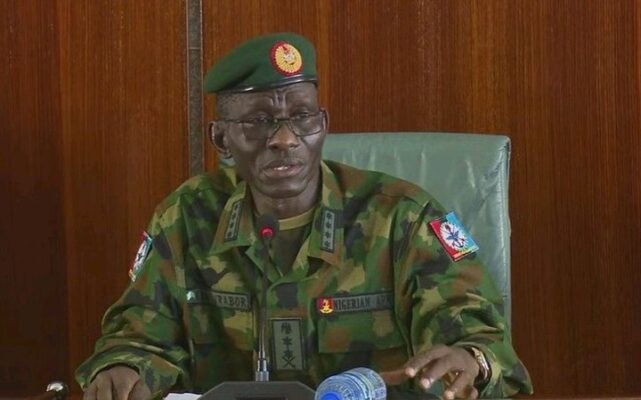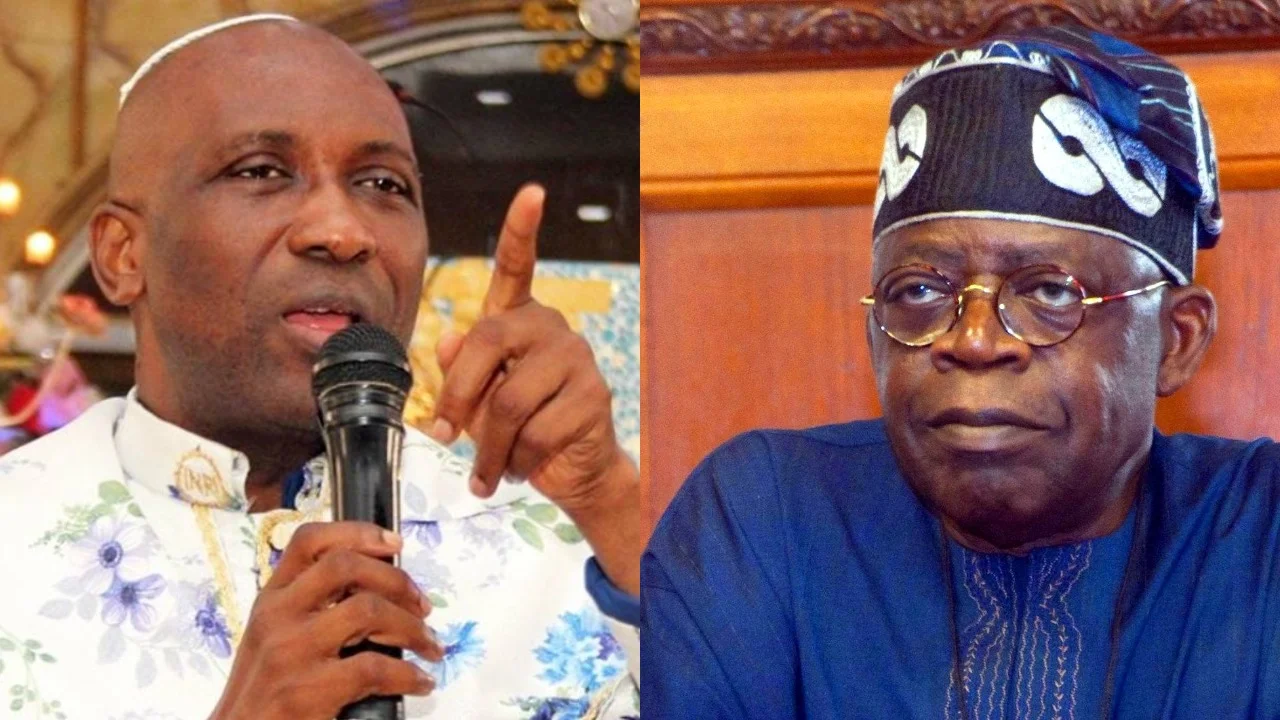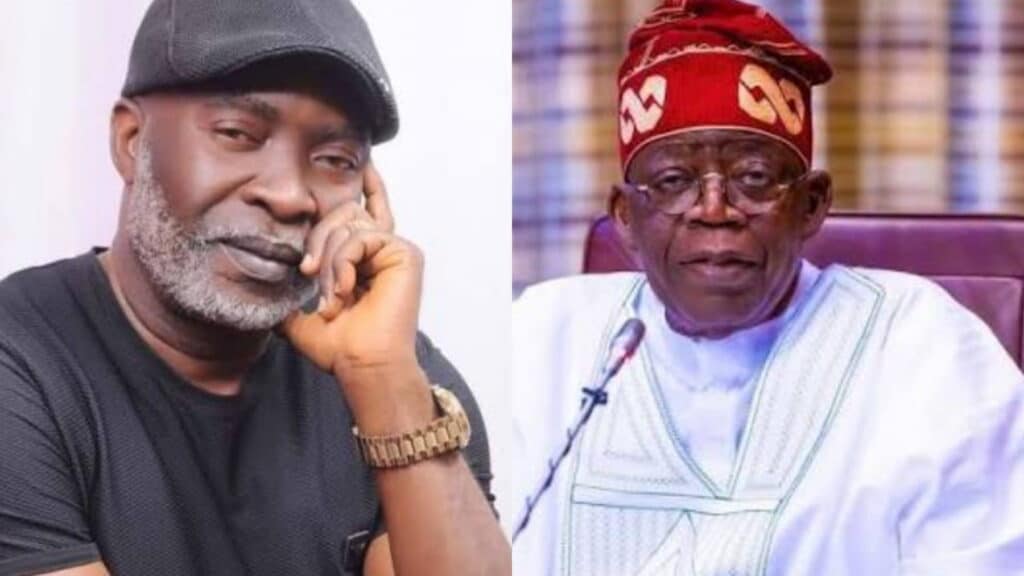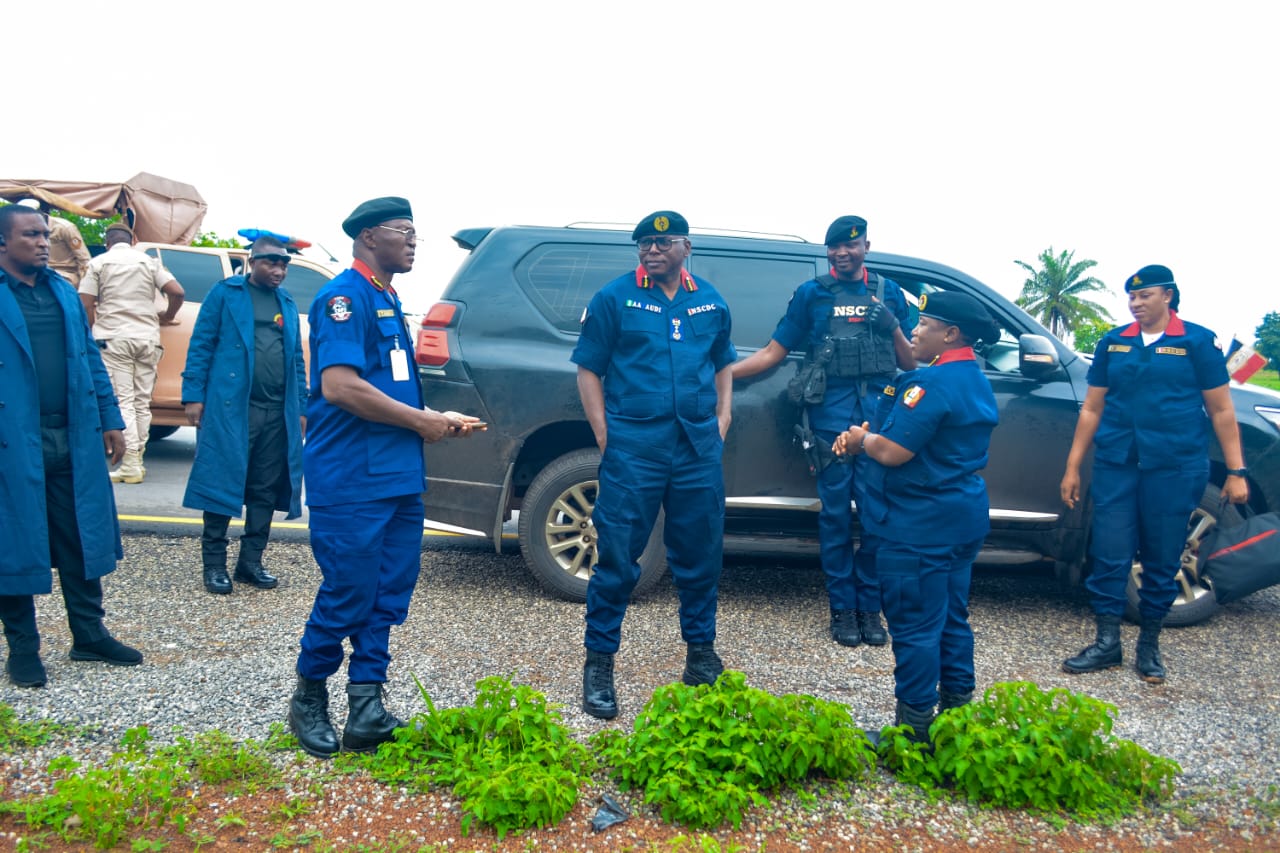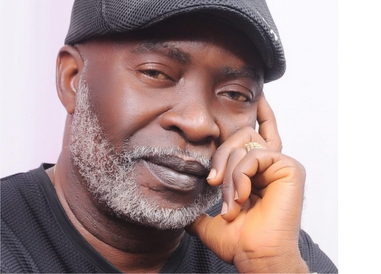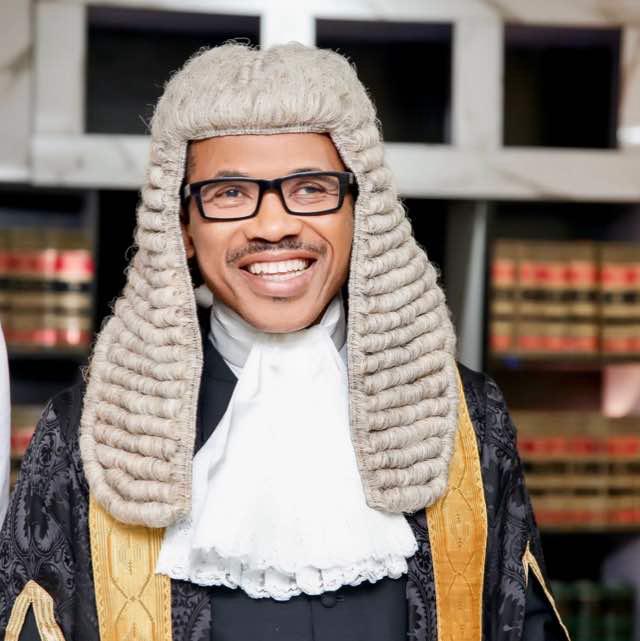This lecture examines how the media shapes terrorism narratives, influences national security, and supports counter-terrorism efforts in Nigeria through responsible reportage
Protocol
Preamble
I am profoundly honoured to stand before this distinguished assembly of eminent editors and media
Also read: Gainers and losers of Trump’s invasion threat…
professionals at the All Nigeria Editors Conference 2025. The Nigerian Guild of Editors has continually demonstrated unwavering commitment to strengthening our nation’s democratic values and deepening public trust through responsible journalism.
It is, therefore, a privilege to share insights on the topic “Media, Terrorism and National Security: Addressing the Complexities,” which directly speaks to the heart of our national concerns. Pertinently, the chosen theme of this year’s conference, “Democratic Governance and National Cohesion: The Role of Editors,” underscores the pivotal role editors play in shaping narratives that sustain unity and accountability.
It is evident that information management and national stability are inseparable. The media’s responsibility in balancing reportage with sensitivity during security threats cannot be overstated, especially as public perception often determines the resilience of our national fabric.
In this respect, Editors, as gatekeepers of truth, hold a sacred responsibility in preventing fearmongering and misinformation from weakening our social cohesion.
Our discussion today thus invites sober reflection on how journalistic ethics can reinforce both public confidence and national resilience.
This conversation is not only essential but timely, considering the evolving nature of insecurity and public communication in the country.
I must therefore commend the Nigerian Guild of Editors for creating this platform for meaningful dialogue that advances both professional integrity and the national interest. It is on this note that I humbly proceed to engage our collective intellect on this vital national discourse.
INTRODUCTION
1. The media, across the world, has evolved into a strategic actor in shaping perceptions of global peace, conflict, and collective security.
In recent decades, the role of media in influencing terrorist narratives, recruitment, and counter-terrorism strategies has gained unprecedented attention from international institutions.
As terrorism continues to adapt across continents, media reportage and framing have become powerful tools capable of either mitigating or magnifying security threats depending on the accuracy, tone, and ethical responsibility of coverage.
It is therefore evident that media practices have far-reaching consequences on how societies interpret and respond to terror incidents, thereby influencing the strength and resilience of state security systems.
Moreover, as transnational terrorism becomes more networked, the power of communication technologies in shaping public sentiment and governmental response has grown profoundly.
According to the United Nations Office of Counter-Terrorism (UNOCT, 2024), over 80 per cent of extremist propaganda circulates through mainstream and alternative media outlets, reinforcing the urgency for responsible reporting.
Therefore, understanding the dynamic interplay between media influence and terrorist communication strategies provides a compelling foundation for advancing collective security and strengthening national security.
2. Remarkably, contemporary global realities have underscored how terrorism strategically exploits media channels to amplify fear and influence public perception.
The United Nations Educational, Scientific and Cultural Organization (UNESCO) observes that distorted news dissemination intensifies public anxiety and destabilizes cooperative security efforts among States.
Similarly, the World Economic Forum (2024) notes that coordinated misinformation campaigns have escalated radical narratives, thereby complicating counter-terrorism coordination.
In response, nations have progressively strengthened professional media reportage through collaborative policy reforms and inter-agency information protocols aimed at enhancing counter-terrorism and national security.
In democratic societies, the legitimacy of national protection rests on the ability to defend life and order without undermining justice, freedom, or the public’s right to know.
This is so because, when courage gives way to silence, and any perceived danger is used as justification for stifling critique, the very safeguard intended to protect society can become a threat.
Hence, national security is viewed as the strategies, institutions, laws, and practices by which a state seeks to protect its territory, citizens, and institutions from internal and external threats.
3. Ladies and Gentlemen, the relevance of today’s discourse cannot be overemphasised. Nigeria’s security challenges are deeply intertwined with the dynamics of media representation and the public’s access to credible information.
According to the National Security Strategy (NSS, 2019), effective security management depends not only on intelligence gathering and military response but also on how the media interprets and disseminates information about such operations to the citizenry.
Scholars such as Nwabueze (2020) and Asemah (2024) have also argued that partnership between journalists and security operatives could reduce terrorist propaganda by over 40 per cent when properly institutionalised.
I therefore wish to stress that, the media remains a vital pillar in counter-terrorism communication, capable of strengthening or weakening public trust in governance depending on how reports are structured.
Indeed, the National Broadcasting Commission (NBC) has continuously emphasised responsible journalism in conflict-sensitive reporting, as misinformation or sensational coverage has often exacerbated public fear and hindered military operations in counter-insurgency zones.
This situation demands urgent reflection and ethical reorientation among media professionals on how best to report issues of national security without compromising state strategy or public confidence.
Hence, it becomes imperative that we collectively explore strategic mechanisms that would promote responsible media engagement in the national security architecture.
AIM
4. Therefore, this lecture aims to guide our collective reasoning toward strengthening professional collaboration, ensuring responsible reportage, and addressing the evolving complexities of media, terrorism, and national security in Nigeria at this defining moment in our nation’s history.
SCOPE
6. The paper will cover the following areas:
a. Conceptual Clarifications.
b. Nature of the Roles of the Media in Support of the Counter-Terrorism Efforts in Nigeria.
c. Institutional and Professional Contributions of Nigerian Guild of Editors.
d. The Necessity for Deliberate Collaborative Media Engagement.
e. Overview of the Challenges Associated with the Media in Support of Counter-Terrorism in Nigeria.
f. Strategies to mitigate the Challenges of the Media in Support of Counter-Terrorism in Nigeria.
CONCEPTUAL CLARIFICATIONS
MEDIA
7. This is an esteemed audience of media professionals and scholars, mixed with policymakers and leaders of repute who have ample knowledge of the various concepts. Therefore, little clarification would be given.
In this wise, it is necessary to keep in mind the National Broadcasting Commission (NBC) view on media.
It sees the media as the institutionalised means of mass communication used to inform, educate, and influence public perception toward societal stability and development.
This definition is particularly relevant for our discourse, as it highlights the media’s responsibility in fostering social order and ensuring that national narratives support peace and security.
8. Therefore, it is important to stress that the media in Nigeria operates not merely as an information channel but as a national stabilising instrument.
Furthermore, one must recognise that the manner in which the media reports acts of terrorism significantly shapes public perception and governmental response.
Hence, for the purpose of this lecture, media shall be operationally defined as the organised system of communication and information dissemination employed to shape public understanding, guide national discourse, and support the coordinated defence of state security interests.
Accordingly, as we proceed, it becomes crucial to understand the media not only as a societal mirror but as a vital instrument in sustaining national resilience and promoting collective security consciousness.
TERRORISM
9. The intention here is not to give a scholarly treatise on terrorism but to curate a common understanding as we explore the complexities within the context of media, terrorism and national security matters.
Various scholars and establishments define terrorism based on its motives, strategies, and security implications.
According to the United Nations Office on Drugs and Crime (UNODC, 2023), terrorism refers to acts intended to cause death or serious harm to civilians with the purpose of intimidating a population or compelling a government or international organisation to act or abstain from acting.
While this definition is globally recognised, it overlooks the specific socio-political realities and evolving patterns of terrorism within fragile national security systems such as Nigeria’s.
From a domestic outlook, the Terrorism (Prevention and Prohibition) Act (Federal Republic of Nigeria, 2022) conceptualises terrorism as any act that involves violence or the threat of violence against persons or property intended to intimidate, coerce, or destabilise the government or society.
This definition reflects the contextual realities of Nigeria’s security environment, including insurgency, banditry, and extremist propaganda that exploit societal vulnerabilities and media narratives to achieve destructive objectives.
10. In deference to the foregoing therefore, it is important to note that terrorism in Nigeria today transcends physical attacks; it also encompasses psychological warfare and media manipulation aimed at undermining public trust in state institutions.
Consequently, for the purpose of this lecture, terrorism shall be operationally understood as the deliberate orchestration of fear-driven violence and information distortion by non-state or ideological actors to weaken national unity, disrupt governance processes, and challenge the authority of the state.
Therefore, as we proceed, it becomes imperative to understand terrorism not only as an act of violence but as a calculated strategy that exploits media exposure, manipulates emotions, and threatens the very foundation of national security and societal cohesion.
NATIONAL SECURITY
11. One fundamental purpose of government is to ensure security of the state, territory and its people. This simple statement is laden with diverse interpretations, enormous responsibilities, and innumerable strategic choices.
No matter its scope, national security remains one of the most essential obligations that every government must uphold using all legitimate instruments of power and persuasion.
In essence, national security transcends the protection of the nation-state. It is in this vein that the UNDP advocates that governments should view national security from a human security perspective.
The totality being that policies should seek to focus attention on the human person as the object of the existence of states.
This multidimensional approach makes security more enduring, conferring immense value to the human person through poverty reduction and elimination of social inequality, fear, anxiety, and their associated impacts.
12. From a national perspective, the Nigerian National Security Strategy 2019 (NNSS 2019) views the concept of national security as the capacity of the state to preserve its sovereignty, ensure the protection of its citizens, defend its territorial integrity, and maintain peace, law, and order.
It underscores the interconnection between democratic stability, economic resilience, and the protection of civil liberties as pillars of a secure nation.
This definition is considered most appropriate within our context because it reflects the security realities of Nigeria, where threats such as insurgency, terrorism and other acts of violent extremism, as well as information manipulation, pose direct challenges to national stability and social harmony.
It is considered suitable as an operational guide for this lecture. Hence, national security should be viewed as the sustained ability of a state to safeguard its territorial integrity, democratic institutions, and citizens’ welfare against internal and external threats, while fostering peace, social justice, and sustainable development.
So, let us keep in mind that the media, when responsibly engaged, remains not just a conveyor of information but also a strategic ally in reinforcing national security and countering terrorism through credible narratives and patriotic reportage.
NATURE OF THE ROLES OF THE MEDIA IN SUPPORT OF COUNTER-TERRORISM EFFORTS IN NIGERIA
INFORMATION AND SURVEILLANCE IN COUNTERTERRORISM CONTEXTS
13. The first and perhaps most traditional function of the media in combating terrorism lies in its information dissemination and surveillance capacities.
The Nigerian media serves as the primary channel for disseminating verified security updates and early warnings to citizens, often complementing official briefings from security and other government agencies.
According to the Nigerian Broadcasting Commission, over 80 per cent of Nigerians rely on radio and television as their main sources of security-related information.
This level of reach underscores the vital role of timely and accurate reportage in reducing panic and misinformation during crises.
14. Furthermore, investigative journalism has exposed the operations of extremist networks and illicit arms routes, thereby aiding the efforts of the government agencies in gathering intelligence for operations.
As we reflect on these contributions, it becomes evident that the surveillance and watchdog roles of the media are indispensable in prompting both government action and civic preparedness against terrorist threats.
AGENDA-SETTING FRAMING AND PUBLIC SENSITIZATION FUNCTIONS
15. It is important to highlight that the media’s power to set public discourse significantly influences how the citizens perceive terrorism and national security.
It should be noted that by determining which issues dominate public attention, media outlets frame the urgency of collective vigilance, response, and cooperation with law enforcement agencies.
The Institute for Peace and Conflict Resolution posited that over 65 per cent of urban Nigerians form their opinions on national security from media narratives.
When these narratives are balanced, they reinforce trust and promote civic responsibility. On the other hand, when sensationalized, they risk amplifying fear and division.
Today, the public perception of military efforts in counter-terrorism and national development are largely shaped by the media.
The question that remain however, is how factual and unbiased are those assessments? Are they targeted at individuals or political regimes as opposed to reinforcing capacities of institutions and national causes?
16. Be that as it may, public sensitisation campaigns such as the “See Something, Say Something” initiative, amplified across television, radio, and online platforms, have encouraged community vigilance and reporting of suspicious movements.
This strategic media engagement not only builds solidarity among citizens but also strengthens the social fabric necessary for preventing radicalization as well as sustaining national unity.
MEDIA PLATFORMS AS CHANNELS FOR CIVIC MOBILISATION SOCIAL COHESION AND DE-RADICALISATION CAMPAIGNS
17. The media has the capacity to mobilise citizens for peace and reintegration. Entertainment channels such as Nollywood and radio talk shows, have infused counter-radicalisation themes into their productions.
For example, the film Voices from the North-East released in 2022 portrayed the dangers of extremist indoctrination and the power of social reintegration.
Equally, radio stations in Jos and Maiduguri have successfully used indigenous language programmes to encourage inter-ethnic dialogue and promote forgiveness among communities affected by violence and terrorism.
Similarly, social media campaigns tagged #NotInOurName and #SecureNigeria have engaged thousands of youths in nationwide awareness against violent extremism.
18. Therefore, Public – Media engagement programmes coordinated by the NBC have improved citizens’ trust in counter-terrorism measures.
Even though challenges remain, it is apparent that civic-oriented media content has become a vital mechanism for promoting social cohesion, national healing, and youth inclusion in peacebuilding processes.
STRATEGIC COMMUNICATION COUNTER-NARRATIVES AND PSYCHOLOGICAL OPERATIONS
19. Extremist propaganda thrives on information distortion. The approach of countering such messaging requires deliberate and credible communication. This is the place of Federal Ministry of Communication and National Orientation.
State media outlets such as the Nigerian Television Authority (NTA) and Voice of Nigeria (VON) have been instrumental in advancing peace communication, promoting dialogue, and projecting the resilience of affected communities.
20. Equally important, private broadcasters and online newsrooms have joined these efforts by adopting editorial codes that reject hate speech and inflammatory content.
When aligned with security institutions, these platforms serve as psychological tools that weaken terrorist morale and fortify citizens’ faith in the nation’s defence mechanisms.
INSTITUTIONAL AND PROFESSIONAL CONTRIBUTIONS OF THE NIGERIAN GUILD OF EDITORS
21. Ladies and Gentlemen, it is essential to acknowledge that the Nigerian Guild of Editors (NGE) has been at the forefront of institutional efforts to promote security-sensitive journalism.
The NGE’s annual conference in 2023 focused on “Media and National Stability”, providing a platform where editors discussed the ethical challenges of covering insurgency without amplifying terrorist propaganda.
Additionally, the Guild has organised capacity-building workshops in Abuja, Lagos, and Maiduguri in collaboration with the ONSA and the International Press Centre.
These programmes have trained over 350 editors and reporters on conflict-sensitive reporting and counter-radicalization communication strategies.
22. Moreover, the NGE has maintained productive partnerships with international organisations, including UNESCO and the European Union, to enhance editorial quality in terrorism reportage.
Its public statements often emphasise the need for unity and discourage narratives that stigmatise communities affected by insurgency.
In recognition of these sustained efforts, the NGE has become a central institution promoting peace-driven journalism in Nigeria.
Its continuous advocacy ensures that national security objectives align with journalistic professionalism. Indeed, this conference and the discourse are clear testaments to the worthy contributions of NGE. Please keep it up.
THE NECESSITY FOR DELIBERATE COLLABORATIVE MEDIA ENGAGEMENT
23. The trust quotient within societies and their governments determines the type of collaboration with the media.
For Nigeria, the quotient is abysmally low. The idea for collaborative media engagement and upscaling the media reportage systems to curtail terrorism incidences and enhance national security has been exploited by different countries.
France, for instance, has faced recurring complexities in managing media reportage, terrorism, and national security, with over 265 terror incidents recorded between 2015 and 2022.
These concerns were further aggravated by the spread of extremist propaganda across online media platforms, accounting for a 41 per cent rise in radical content between 2016 and 2020.
The absence of coordinated media oversight in earlier years hindered counter-terrorism efficiency, as France experienced a 28 per cent surge in lone-wolf attacks between 2015 and 2019.
Accordingly, the French Government, instituted the National Plan for Media Responsibility and Counter-Extremism Reporting in 2020.
These strategic measures significantly enhanced professional standards. Accurate media reportage on terrorism improved by 37 per cent, in addition to misinformation declining by 42 per cent between 2020 and 2023.
Notably, the outcomes reflected remarkable national security gains, as terror-related deaths declined from 238 in 2016 to less than 20 in 2023 according to Global Terrorism Index.
Today, France’s coordinated media management system stands as a credible model across Europe, where strengthened media responsibility has reinforced counter-terrorism efforts and sustained national security.
24. Equally, Pakistan recorded over 319 terrorism-related incidents in 2014, claiming more than 1,760 civilian lives.
It was observed that weak media regulation and politicized reportage deepened disinformation, with over 42 per cent of national news outlets accused of spreading unverified security reports between 2015 and 2017.
Consequently, ineffective media coordination impeded counter-terrorism communication, allowing extremist propaganda to reach an estimated 21 per cent of the population through unfiltered digital broadcasts.
In response, the central government, through the Ministry of Information and Broadcasting in collaboration with the Pakistan Federal Union of Journalists, established the National Media Coordination Committee in 2018 to standardise security reportage and promote professional ethics.
These interventions enhanced media professionalism, reducing misinformation-related security lapses by 67 per cent and improving coordinated crisis coverage by 58 per cent between 2019 and 2023.
As a result, Pakistan’s Global Terrorism Index score improved from 8.6 in 2014 to 7.1 in 2023, reflecting strengthened national resilience.
Currently, Pakistan’s well-coordinated media space demonstrates how improved reportage and responsible communication have substantially enhanced counter-terrorism outcomes and reinforced national security.
25. Furthermore, in 2019, Sri Lanka faced the devastating Easter Sunday bombings, in which 269 people were killed and more than 500 injured (BBC, 2019).
In response, the government declared a state of emergency and temporarily blocked major social media platforms such as Facebook, WhatsApp, and YouTube, citing fears of disinformation and provocation (Reuters, 2019).
While these measures limited the immediate spread of harmful content, they also disrupted essential communication for civilians and businesses, raising enduring debates about balancing freedom of expression with national stability.
The Sri Lankan authorities further broadened police and military powers through emergency regulations, enabling arrests and searches without warrants.
26. Ladies and Gentlemen, back home in Nigeria, the interplay between media reportage, terrorism, and national security continues to define the character of the nation’s internal stability and global image.
Over the years, the Nigerian media has played a central role in shaping narratives around insecurity, insurgency, and public perception of state response institutions and mechanisms.
However, the growing complexities of terrorism, particularly from groups such as Boko Haram and the Islamic State in West Africa Province (ISWAP), have challenged traditional journalistic practices and national security operations.
According to the Global Terrorism Index (2024), Nigeria ranked 8th among countries most affected by terrorism, with over 1,200 terrorism-related deaths recorded in 2023 alone.
Ironically, the data for such analysis came from local media sources. Therefore, such statistics no doubt underscore the urgent need for deliberate engagement between the media and security institutions to harmonise information dissemination and intelligence communication toward safeguarding national interests.
OVERVIEW OF CHALLENGES ASSOCIATED WITH THE MEDIA IN SUPPORT OF COUNTER-TERRORISM EFFORTS IN NIGERIA
COMPLEXITIES
27. Distinguished Guests, Ladies and Gentlemen, the complexities associated with media and terrorism stem from the need to balance freedom of the press and national security concerns.
On one hand, the terrorists feed on extensive media coverage to promote their ideology. In this regard, the media becomes a tool in the hands of terrorist organizations.
On the other hand, excessive media coverage can create confusion and sometimes hinder efforts of agencies involved in counter terrorism operations.
They may be at cross-roads as to which side of the divide the media is operating. The media could thus be seen as glorifying terrorist activities.
This is even more profound given that the trust quotient of Government over the years is so low. Besides, open source media, reinforced by social media complicates the situation.
As a result, a delicate balancing act is necessary to ensure that while reporting activities of terror groups for public knowledge, the objective of counter measures is not diminished.
The calls for collaboration between the government agencies and media establishments for proper balance of press freedom with national security objectives.
28. Furthermore, we must collectively appreciate that terrorism in Nigeria is not only a security challenge but a symptom of deep socio-political and economic distortions.
High youth unemployment recorded by the National Bureau of Statistics (NBS, 2023) at 53.4 per cent among persons aged 18–35, has created fertile ground for extremist recruitment.
In many northern communities, ideological manipulation thrives amid poverty, governance deficits, and limited educational opportunities.
The politicisation of security management, porous borders across the Sahel, and unchecked arms trafficking have complicated coordinated responses.
Furthermore, ethno-religious divisions have sustained cycles of mistrust, weakening state authority. The proper analysis of the situation and creativity of the media in framing these issues with the right context is essential.
29. Equally, defence budgetary allocations have consistently risen, from ₦934 billion in 2015 to ₦2.2 trillion in 2024 (Budget Office of the Federation, 2024), indicating a strategic shift toward sustained military readiness.
Nonetheless, prolonged military involvement in internal operations has blurred civil–military boundaries, occasionally triggering human rights concerns and accountability debates.
Democratic governance has also felt the strain, as emergency powers and anti-terror laws occasionally intersect with civil liberties.
However, the evolution of national security strategies between 2009 and 2024 reflects adaptive learning, institutional reorganisation, and improved regional coordination.
The broader implication is clear: the sustainability of Nigeria’s statehood and unity depends on effectively harmonising security, development, and civic inclusion.
It is therefore crucial, as we engage further in this discourse, to underscore the importance of a citizen-centered approach that anchors security in justice, participation, and resilience.
ESCALATION AND DIFFUSION OF VIOLENCE
30. Nigeria’s experience with terrorism has evolved from being localized in the northeast to becoming a nationwide security concern.
Between 2021 and 2022, the country recorded more than 4,500 conflict incidents annually, with fatalities exceeding 10,000 each year (Adams et al., 2024).
Boko Haram and its splinter group, Islamic State West Africa Province (ISWAP), expanded their reach beyond Borno, Yobe, and Adamawa into Niger, Zamfara, Kaduna, and Plateau States.
This geographic spread has made coordinated responses more difficult for both media organizations and security forces.
Editors are compelled to cover a wider range of violent incidents, often in remote areas, with limited access to verifiable sources.
The result is a high risk of misinformation, as newsrooms struggle to confirm details before public dissemination, while terrorists deliberately manipulate narratives for propaganda.
31. The diffusion of violence also places journalists in harm’s way. According to Reporters Without Borders (2024), Nigeria remains one of the most dangerous countries in Africa for journalists, many of whom face threats, abductions, or fatalities in conflict-affected regions.
The inability to provide timely and accurate reporting undermines the media’s role as a watchdog, while the spread of unverified stories on social media amplifies panic and erodes public trust.
For national security agencies, delayed or inadequate communication allows extremist narratives to dominate, leaving communities more vulnerable to radicalization.
Thus, the escalation and diffusion of violence create a vicious cycle in which insecurity fuels misinformation, and misinformation worsens insecurity.
LEGAL AMBIGUITY AND PRESS FREEDOM RISKS
32. The passage of the Terrorism (Prevention and Prohibition) Act, 2022 was intended to modernize Nigeria’s counter-terrorism framework.
However, the law has been criticized for vague definitions of terrorism that risk criminalizing legitimate political dissent, activism, or journalistic inquiry.
Journalists covering protests or reporting on armed groups can be accused of “promoting terrorism,” even when their work is rooted in public interest.
This legal ambiguity encourages self-censorship among editors who fear government reprisals, leading to underreporting of critical issues.
The 2024 World Press Freedom Index ranked Nigeria 112 out of 180 countries, with RSF (2024) citing frequent arrests, harassment, and intimidation of journalists.
Such conditions weaken the press’s ability to provide accurate coverage of terrorism and erode transparency in governance.
33. The chilling effect of ambiguous legislation extends to civil society and the public. When citizens perceive the media as constrained or complicit with government narratives, trust in both institutions declines.
A case in point was the #EndSARS protests of 2020, where some journalists faced threats of prosecution for reporting on alleged abuses by security forces; even though the accuracy of their reports remains a key consideration.
If such precedents are applied to terrorism reporting, editors may avoid sensitive topics altogether, leaving room for extremist propaganda to fill the gap.
Without legal clarity and robust protections for press freedom, Nigeria risks weakening both its democratic institutions and its ability to counter terrorism effectively, as misinformation thrives where transparency is lacking.
INSTITUTIONAL AND ETHICAL CONSTRAINTS
34. Beyond legal and security concerns, Nigerian media houses face structural limitations that hinder their ability to report responsibly on terrorism.
Many local outlets lack resources for investigative journalism, conflict-sensitive reporting, or safety training for reporters.
Editors are under pressure to prioritize sensational headlines that attract clicks and sales, often amplifying terrorist propaganda unintentionally.
Adebiyi (2022) found that Nigerian media coverage of the #BringBackOurGirls campaign initially raised awareness but also risked reinforcing Boko Haram’s agenda by giving disproportionate visibility to its actions.
Such dilemmas reveal the tension between journalistic duty to inform and the ethical responsibility to avoid glorifying terror. I witnessed this development firsthand in Operation LAFIYA DOLE theatre.
35. Government communication practices further complicate the situation. Security agencies sometimes release delayed, incomplete, or contradictory information about terrorist incidents, leaving media organizations to fill the gap with unverified reports.
This undermines credibility and creates opportunities for misinformation to spread unchecked, especially on social media platforms. Moreover, collaboration between the state and the media remains weak; there are limited structured mechanisms for joint fact-checking, rapid updates, or counter-narrative campaigns.
Without targeted investments in capacity building—such as training, fact-checking infrastructure, and safety protocols—media institutions will remain vulnerable to both external threats and internal weaknesses.
This institutional fragility poses a significant barrier to creating a resilient media ecosystem capable of contributing positively to national security.
INADEQUATE INSTITUTIONAL COORDINATION BETWEEN MEDIA AND SECURITY AGENCIES
36. It must be stated that the effectiveness of the media in supporting counter-terrorism objectives in Nigeria remains constrained by structural, ethical, and institutional bottlenecks.
While the press has often served as a critical platform for national awareness, its contributions are weakened by poor coordination with security agencies, inconsistent regulatory oversight, and recurring threats to press freedom.
It is even worse when the military is left alone to explain the actions it carries out on behalf of the state. As we all reflect together, it becomes necessary to dissect these constraints with clarity and precision to appreciate the urgent need for reforms in order to ensure a more secure nation.
37. Additionally, the establishment of the Media and Security Stakeholders Forum in 2023 has improved the coordination of communication strategies between journalists and defence agencies.
The integration of institutional partnerships has therefore proven essential for sustaining a coherent national narrative that prioritises security, accountability, and public confidence.
However, maintaining the balance between press freedom and national security remains a delicate task. Ethical restrictions prevent the publication of operational details that may compromise field missions, while ensuring transparency to the public.
It is noteworthy that the Nigeria Union of Journalists (NUJ) Code of Ethics (2022 Edition) guides responsible reporting, ensuring that news on terrorism is factual, balanced, and devoid of sensationalism.
WEAK REGULATORY OVERSIGHT AND ETHICAL BREACHES IN TERRORISM REPORTING
38. Weak regulatory enforcement by institutions such as the National Broadcasting Commission, the Nigerian Press Council, and the Nigerian Union of Journalists (NUJ) has permitted sensational terrorism coverage.
Some broadcasts and publications have unintentionally amplified terrorist propaganda. Notably, during several Boko Haram attacks in 2019, unverified videos and inflated casualty figures circulated widely.
Given the generally gullible frame of the Nigerian society, it intensified public panic and inadvertently aided extremist psychological warfare.
39. Likewise, the lack of conflict-sensitive reporting guidelines within journalism education and professional training has further deepened this problem.
This is evident as journalists sometimes operate without clear ethical direction when covering complex security situations.
Addressing this challenge requires strengthening media regulation and ethical accountability systems to ensure compliance with professional standards, establish terrorism-reporting protocols, and mandate regular ethics certification for practicing journalists.
This will promote accuracy, responsibility, and public confidence in counter-terrorism reportage across Nigeria.
LIMITED CAPACITY AND TECHNOLOGICAL INFRASTRUCTURE FOR COUNTER-TERRORISM JOURNALISM
40. It is pertinent to note the pressing capacity deficits confronting terrorism reporting in Nigeria. The situation is such that most journalists assigned to cover conflict zones lack specialised training in counter-terrorism journalism and digital security.
In most instances, many depend on second-hand accounts due to safety concerns and lack of protective equipment.
The chronic underfunding of news organisations further limits their ability to sustain investigative coverage in high-risk regions such as North East and North West Nigeria.
41. Additionally, many media houses lack encrypted communication systems, leaving field reporters susceptible to surveillance and cyberattacks.
Accordingly, enhancing journalistic capacity and digital infrastructure for counter-terrorism reporting through sustained funding, security training, and advanced technological support will foster a culture of professional, safe, and fact-driven journalism that strengthens national resilience against terrorism.
THE CHALLENGE OF CONTEXTUAL ALIGNMENT OF FOREIGN MEDIA CONTENTS
42. As a direct consequence of limited capacity of local media, most times the foreign media have been relied upon for news on counter-terrorism in Nigeria.
This is most appalling as it presents the challenge of misalignment of the contexts of the foreign media reportage. Globally, national interests prevail with nations interacting on the international stage.
The framing and contexts of news items are usually crafted to first satisfy the interest – however defined, of the reporting state.
43. Our experience in most cases, has shown reportage on our counter-terrorism efforts by some foreign media are tangential to the operational objectives.
The Reuters and Amnesty International have seen at the forefront of promoting narratives that are misaligned.
Regrettably, local media houses have relied on these platforms to propagate views to the detriment of counter-terrorism objectives.
Going forward, there is a need to build local capacity and resilience in media reporting. I believe that Nigerian Guild of Editors possess the strength and capacity to develop a thriving media institution that can attract global reckoning and prestige.
STRATEGIES TO MITIGATE CHALLENGES OF MEDIA IN SUPPORT OF COUNTER-TERRORISM IN NIGERIA
44. In addressing the challenges confronting the media’s role in counter-terrorism, it becomes imperative for this discussion to highlight actionable strategies that strengthen the media–security interface in Nigeria.
As we engage in this vital national conversation, it is essential to recognise that effective counter-terrorism communication demands structured coordination, ethical responsibility, professional competence, and legal safeguards. Therefore, the following strategies are proposed to enhance the media’s operational capacity and institutional relevance in promoting the government’s counter-terrorism efforts in Nigeria.
NATIONAL GUIDELINES FOR TERRORISM REPORTING
45. A coordinated task force comprising editors, security agencies, and human rights organizations should be established to develop comprehensive guidelines for terrorism reporting.
These guidelines should cover verification standards, framing of narratives, ethical use of imagery, and the protection of sources.
Within 18 months, at least 80% of media houses are expected to adopt the guidelines, with periodic audits conducted to measure compliance and assess levels of public trust.
Such a framework would reduce sensationalism, enhance journalist safety, and promote responsible reporting that resists the manipulative strategies of terrorist groups.
46. By embedding these practices into the professional culture of Nigerian journalism, the media can strengthen its watchdog role while avoiding unintentional amplification of extremist propaganda.
Clear guidelines would also create a shared framework between government and media institutions, reducing friction in moments of crisis.
Ultimately, national guidelines ensure that reporting protects both democratic freedoms and public safety without compromising credibility.
LEGAL AND INSTITUTIONAL REFORM
47. The 2022 Terrorism (Prevention and Prohibition) Act, though comprehensive, contains vague provisions that risk undermining journalistic independence.
Reform is needed to amend ambiguous definitions of terrorism, embed procedural safeguards for arrests, and explicitly protect journalistic confidentiality.
Within 24 months, targeted amendments should be passed to clarify definitions and reduce arbitrary arrests by at least 50%. These legal adjustments will balance the imperatives of security with the preservation of press freedom, ensuring that media institutions continue to serve as watchdogs rather than becoming casualties of counterterrorism policy.
48. Such reforms will also build public trust in both the legal system and the media, strengthening democratic resilience.
When journalists feel legally protected, they are more likely to engage in investigative reporting that exposes extremist networks and corruption that may fuel insecurity.
By addressing legislative ambiguity, Nigeria can ensure that its counterterrorism framework is not only robust but also consistent with international human rights standards.
CAPACITY BUILDING AND COMMUNICATION INFRASTRUCTURE
49. Beyond legal reforms, long-term resilience requires strengthening the capacity of both journalists and government communication systems.
Investments should focus on nationwide infrastructural improvements and journalists’ training programmes, including the establishment of fact-checking units, and the development of safe reporting practices in conflict zones. Among other things, the training should focus on responsible reportage.
The concept of’ ‘’Peace Journalism’’ and investigative journalism should seek to advance peaceful coexistence, factual and conflict-sensitive reporting.
At the same time, government communication systems must be improved to reduce delays in reporting incidents in order to reduce reliance on rumors and unofficial accounts.
Building such capacity will not only reduce the spread of misinformation but also foster collaboration between media houses and security institutions so as to counter extremist narratives while strengthening public confidence.
INSTITUTIONALISING MEDIA–SECURITY AGENCY COLLABORATION FRAMEWORKS
50. Ladies and gentlemen, permit me to emphasise that one of the most pressing needs in Nigeria’s counter-terrorism architecture is structured cooperation between the media and security institutions.
Accordingly, establishing a National Media–Security Coordination Council (NMSCC) under the Federal Ministry of Information and National Orientation would serve as a formal platform for intelligence–information exchange.
Such an institution would enable regular joint briefings, verified updates, and guided access to operational details, thereby eliminating sensational or conflicting narratives that often undermine national security communication.
This takes into account the concept of “Citizenship Media”. Here, the view sees media as builders of nations. They shape society. What you say is what you get.
Therefore, as Media practitioner, whatever you do, always ask yourself, does it align with the kind of society you envision? Your actions must not lead to self-destruction.
51. Hence, the establishment of the NMSCC would, no doubt, institutionalise trust, streamline crisis communication, and promote synergy between journalists and security agencies, with the ultimate objective of strengthening national security architecture.
In furtherance of this, the development of a Counter-Terrorism Media Protocol Handbook would define operational boundaries, ethics, and reporting obligations for journalists covering security-related issues.
This structured guide would promote coherence in reportage and sustain the integrity of national counter-terrorism messaging. In all, the delicate balancing act, earlier discussed, remains the focal point of collaboration between the media and security agencies.
STRENGTHENING MEDIA REGULATION AND ETHICAL ACCOUNTABILITY
52. In terms of policy and ethical dimensions, it becomes clear that regulatory frameworks play an indispensable role in guiding responsible journalism.
The National Broadcasting Code (2023), Freedom of Information Act (2011), and NUJ Code of Ethics collectively ensure that terrorism-related reports are accurate, contextually framed, and security-sensitive.
Media institutions have also instituted internal editorial guidelines to prevent sensationalism and to protect the identities of victims and operatives.
The NBC, in coordination with the Nigerian Press Council, has enforced disciplinary measures against outlets found propagating misinformation during national crises.
As regards ethical dimension of counter-terrorism reportage, it is essential to assert that self-regulation alone can no longer guarantee accountability in sensitive security coverage.
Hence, the establishment of a Joint Media Ethics Oversight Committee involving the Nigerian Broadcasting Commission, Nigerian Press Council, Nigerian Guild of Editors, Nigerian Union of Journalists, and Civil Society Organisations (CSOs) is proposed.
This committee would monitor terrorism-related reportage, enforce sanctions for ethical breaches, and promote balanced narratives that support state security priorities.
53. Furthermore, integrating Conflict-Sensitive Reporting Guidelines into national broadcasting standards and press codes would align journalism practice with the ethical imperatives of peacebuilding and security consciousness.
A certification scheme for journalists covering terrorism would ensure that only trained professionals handle such critical assignments.
Within the Nigerian milieu, these aforementioned ethical mechanisms would restore credibility in terrorism reportage, enhance public confidence, and ensure that the media functions as a responsible partner in national security management.
ENHANCEMENT OF PUBLIC RELATIONS DISPOSITION OF GOVERNMENT
54. There is need to make a distinction between Public Relations and Journalism reportage. Government spokespersons must be measured and less combative in responding to citizens’ inquisitions.
It should be noted that there is a social contract between government and citizens. In that regard, government spokespersons should be measured, possessing the aptitude for restraint, maturity and controlled messaging in order to build confidence, credibility and trust among the citizenry.
The tendency to be abrasive and confrontational must be avoided at all costs. They should not convey a sense of lordship over the people.
CONCLUSION
55. Ladies and Gentlemen, the media remains indispensable in the counter-terrorism efforts in Nigeria. It is both a strategic communicator and a partner in intelligence management, civic education, and counter-narrative promotion.
The media both conventional and new media have consistently provided information, shaped national consciousness, and reinforced citizens’ confidence during crises.
In all these, the Nigerian Guild of Editors especially, and other professional media bodies have contributed immensely to the institutionalisation of ethical journalism and the development of security-sensitive reportage.
56. The increasing and complex nature of terrorism in Nigeria underscores the urgent need for stronger collaboration between the media and security institutions.
As highlighted, establishing formal Media–Security Coordination Frameworks, enhancing professional capacity, and safeguarding press freedom remain essential to achieving effective counter-terrorism communication.
Equally important is the strengthening of ethical accountability systems and digital protection measures for journalists reporting from conflict-prone areas.
When these reforms are pursued with sincerity, the Nigerian media will be better equipped to project balanced narratives, resist extremist propaganda, and promote national unity.
Therefore, it is my firm conviction that a well-supported, professionally guided, and institutionally protected media remains one of Nigeria’s strongest instruments for fostering peace, resilience, and enduring national security.
However, remember that as the last man standing, you do not have the sword to protect yourself if your framing of national security matters leads to the extinction of the first, second and third persons on the realm. Thank you sincerely for your kind attention.
Also read: Gainers and losers of Trump’s invasion threat…
1. References
Adebiyi, K. (2022). Mitigating the impact of media reporting of terrorism: Case study of the #BringBackOurGirls campaign. International Centre for Counter-Terrorism. https://icct.nl/publication/stratcomms-nigeria
Adams, O., Asuelime, L., & Okoro, P. (2024). Spatiotemporal evolution of Nigeria’s armed conflicts and terrorism and the associated shift in social perceptions. Humanities and Social Sciences Communications, 11(1), 1301. https://doi.org/10.1057/s41599-024-03778-9
Amnesty International. (2023). Nigeria: Accountability for human rights violations remains elusive. https://www.amnesty.org/en/documents/afr44/6970/2023/en/
Hudson Institute. (2021, June 22). The counterterrorism conundrum: Exploring the evolution of South Africa’s extremist networks. https://www.hudson.org/national-security-defense/the-counterterrorism-conundrum-exploring-the-evolution-of-south-africa-s-extremist-networks
Reporters Without Borders. (2024). Nigeria – country profile. RSF. https://rsf.org/en/country/nigeria
Abdi, M. (2023). Strengthening Media Ethics and Countering Terror Narratives in Fragile States. African Communication Research Journal, 15(2), 201–219.
Asemah, E. S. (2024). Media Ethics and National Security Reporting in Nigeria: Contemporary Challenges and Policy Implications. Lagos: University of Lagos Press.
Europol (2023). European Union Terrorism Situation and Trend Report (TE-SAT). The Hague: European Union Agency for Law Enforcement Cooperation.
Federal Republic of Nigeria. (2019). National Security Strategy (NNSS 2019). Abuja: Office of the National Security Adviser.
Federal Republic of Nigeria. (2022). Terrorism (Prevention and Prohibition) Act, 2022. Abuja: Government Printer.
Haruna, A. (2023). Communication Strategies and Counter-Insurgency Operations in Northern Nigeria. Abuja: Nigerian Defence Academy Journal of Security Studies, 9(1), 45–67.
Hassan, Y. (2024). Evaluating Media Coordination and National Security in Post-Conflict Somalia. Global Security Review, 9(1), 67–89.
Imobighe, T.A. (1993). Theories of Security and Development: A Conceptual Overview. Ekpoma: Edo State University Press.
Khan, A. (2022). Counter-Terrorism Communication and Public Trust in Pakistan’s Media Landscape. Asian Security Review, 18(1), 44–63.
Le Cam, F. (2021). “Responsible Journalism and National Security: The French Experience.” European Journal of Communication Studies, 45(2), 134–149.
Nwabueze, C. (2020). Mass Communication and National Security in Nigeria. Awka: Nnamdi Azikiwe University Press.
Ojebode, A. (2021). Journalism and National Security: Revisiting the Role of the Nigerian Media in Terrorism Coverage. Ibadan: African Journal of Communication Studies, 14(2), 23–42.
UNESCO (2021). Countering Online Extremism: The Role of Journalism and Media Literacy. Paris: United Nations Educational, Scientific and Cultural Organization.
United Nations Development Programme (UNDP). (1994). Human Development Report 1994: New Dimensions of Human Security. New York: Oxford University Press.
United Nations Office of Counter-Terrorism (UNOCT). (2024). Global Counter-Terrorism Report 2024. United Nations Publications.
United Nations Office on Drugs and Crime (UNODC). (2023). Handbook on Counter-Terrorism Responses and Criminal Justice. Vienna: UNODC Publications.
Former Chief of Defence Staff


